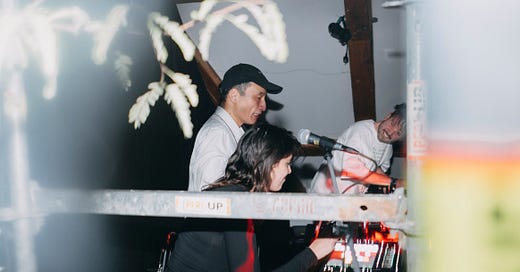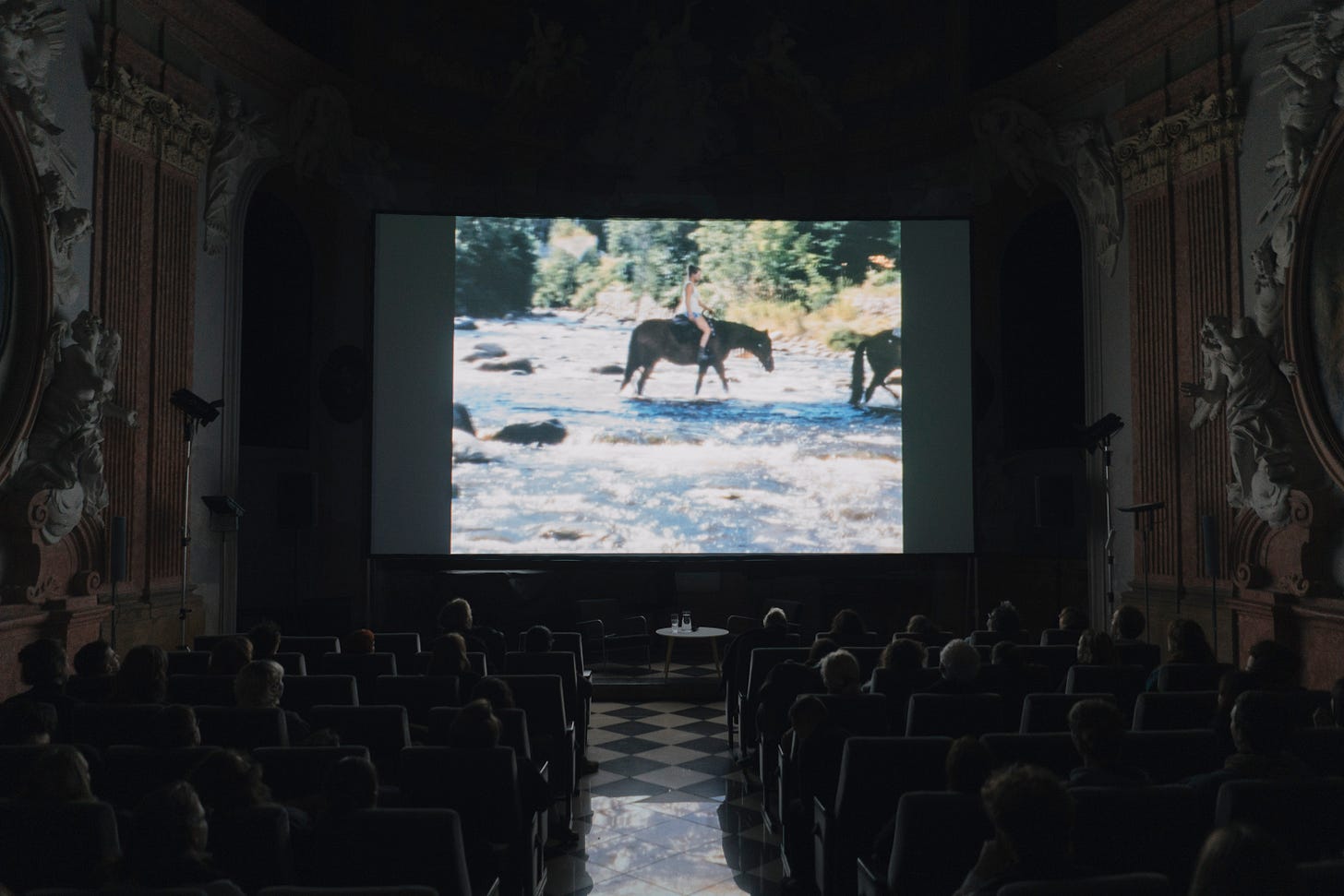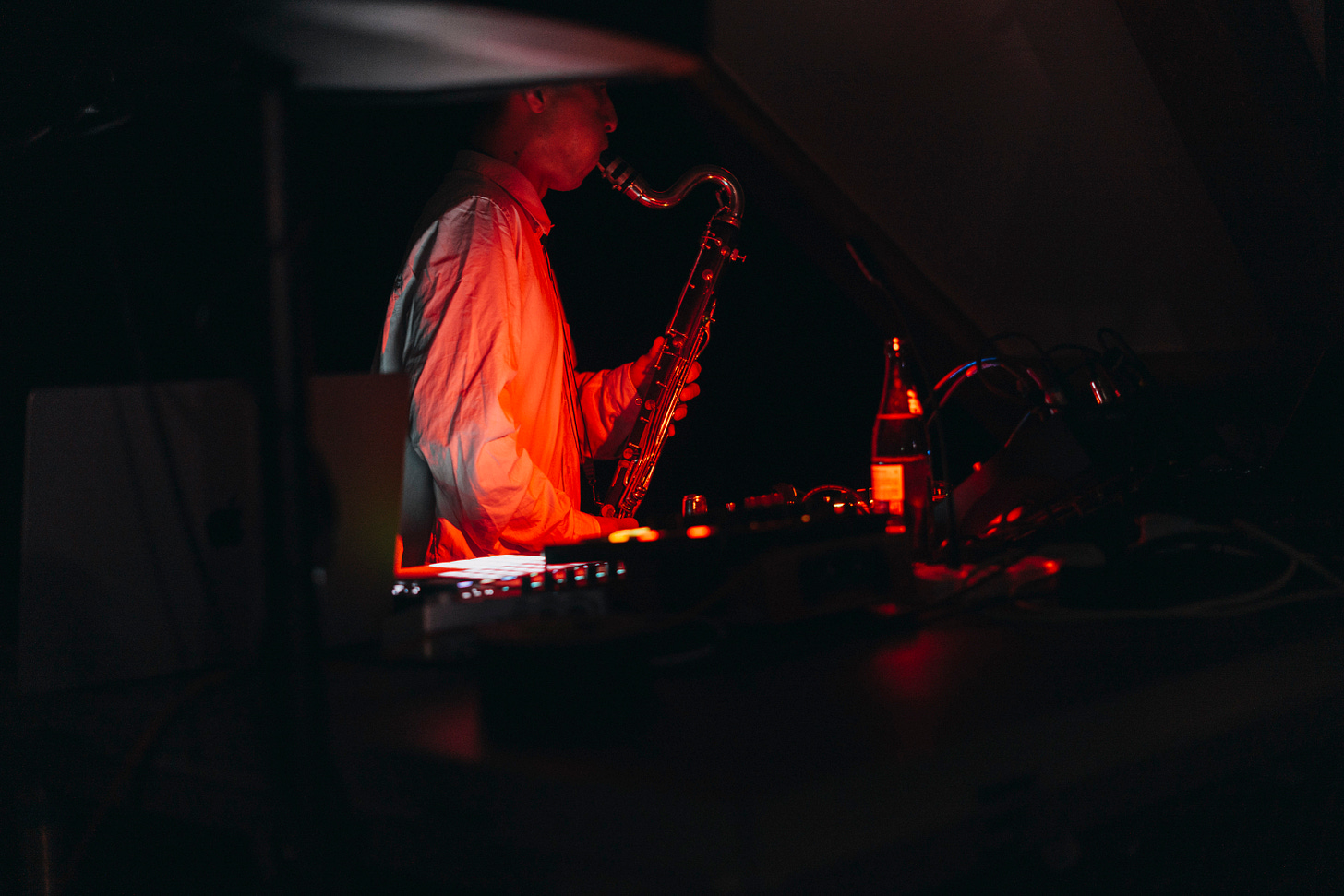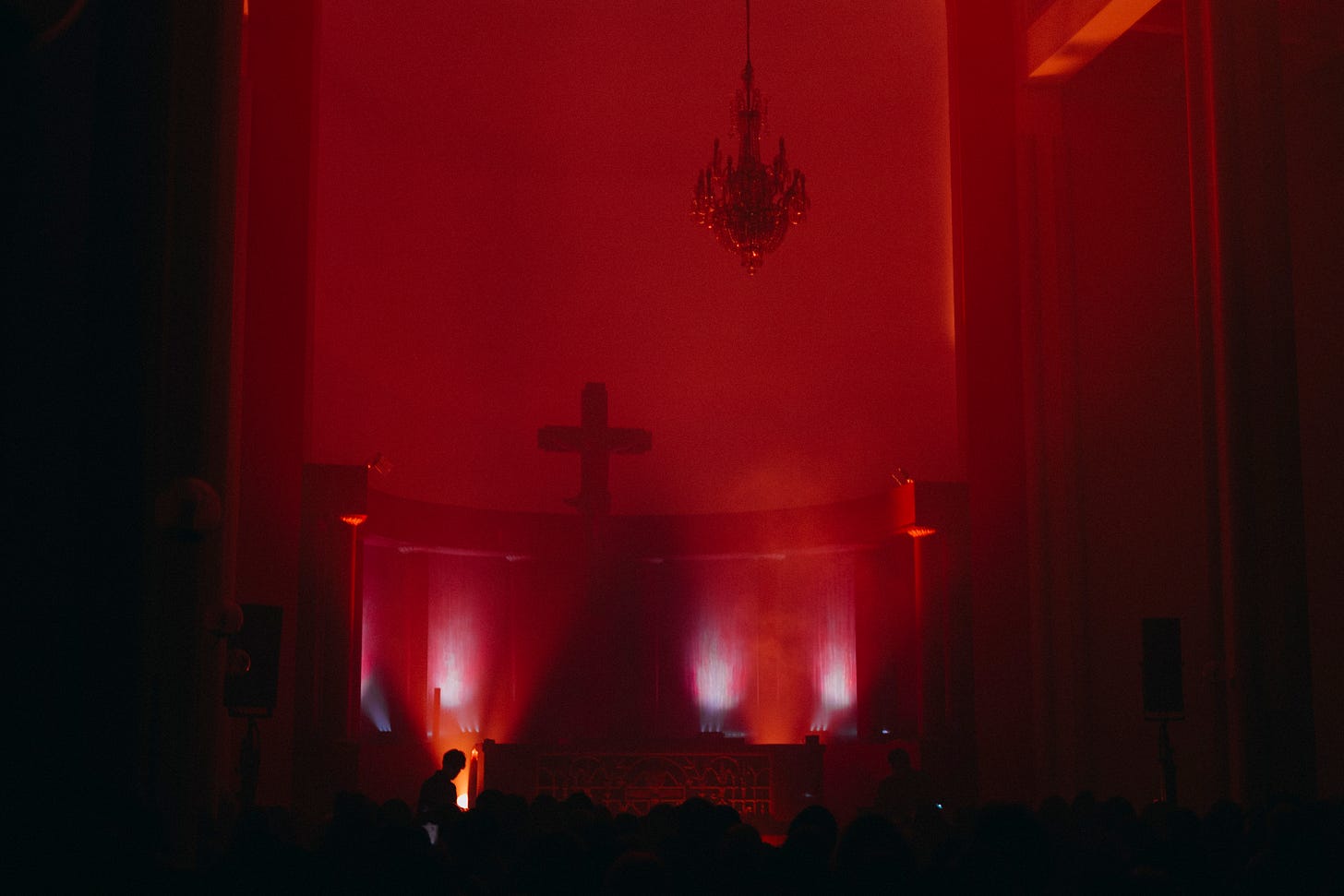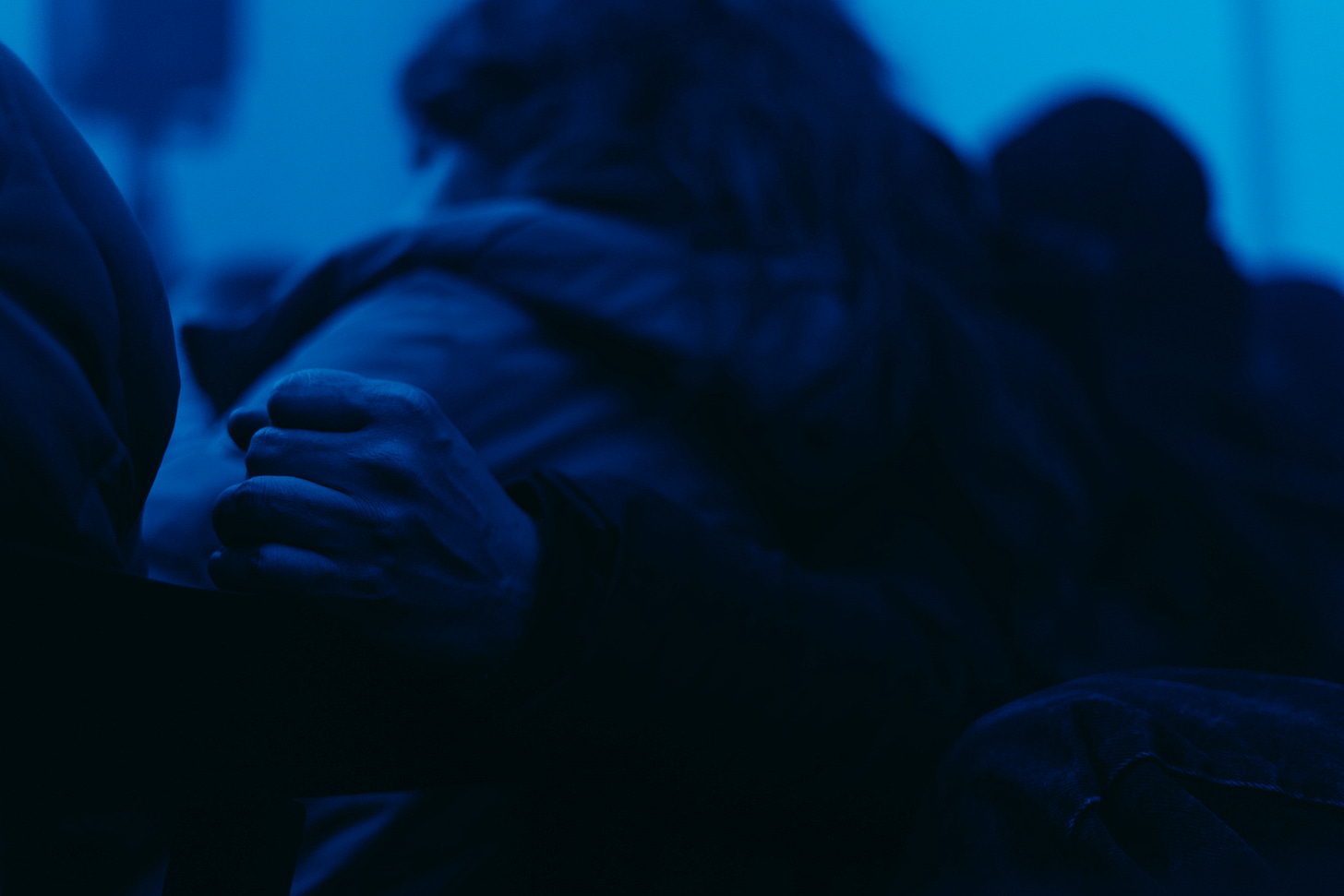PAF Festival, Olomouc 2024
At the beginning of last December I took myself to the town of Olomouc for PAF, a film, art, and music festival which I’d heard and seen much about since moving to Prague. Herein lies the details...
PAF, this year, was creating diaries — a conceptual binding to the festival’s activities, games, workshops and so on. In the notes section of the timetable booklet, I managed one single entry. My new notebook, a Czech-made leatherbound beauty with neatly refillable subsections, was stuffed into my pockets everywhere I went, and the pencilled inscriptions, overlaid in the same spot like years of competitive graffiti, are absolutely illegible to me. What follows is me disentangling the writings and impression-memories. You should check the excellent report by Swarm Magazine if you truly want to know what exactly happens at PAF, although be warned that it’s not strictly the whole truth either…
Good journeys start with breakfast, and I needed it; I’d been at Ankali the night before, and much of my self remained on the pillow. My rucksack lay a tonweight at my feet. Things had changed, but the café still does the best morning eggs in the whole district, a yellow runny scrambled with sharp pickled salad, and decent, soft bread. I never know for sure if I’m taking the right train from Praha Hlavni Nádraži, until it has left, when I finally decide it’s too late to worry now and settle as best I can into the carriage. This one is full; my phone says it feels like -8C outside, but in the vestibule the closeness of strangers has the windows fogging up, and I feel like I’m being infected by their breath. At the border between the Central Bohemian Region and Moravia, snow begins to fall. Before long we’re rattling across a monochromatic plain as we journey deeper into the drift; the deer are conspicuous now, dark shapes against bright ground, but I’m the only one looking when the train passes the herds.
Arriving barely past 3pm, it’s just a few short minutes until night fully drapes the city, streetlight orange called back from the snow, thick, and trodden into inch-thick ice on the perilous Czech cobbles. My bag seems to have grown in weight, and I skate over the hard ground like a drunken hockey puck to where I’ve been instructed to come for accreditation; a massive building, grand, defensive, patriarchal. Young people in trendy scarves stalk out into the snow with rollies clutched in fingerless mitts; I’m in the right place. But it’s an intimidating doorway to walk through alone, and it leads into a daunting corridor, high-vaulted and dizzyingly long. Peering back, through the glass of the entrance doors and through the opposite pair, the corridor continues, warped and Lynchian, on the other side of the portcullis entrance. There’s little sign of where to go from here, and as I flounder, shrunken and foreign in this huge Czech space, a friend comes down the stairs, and offers to lead me to the place I need to go.
The simple friendliness shown in this moment sets a tone that’ll be echoed throughout the festival: come midnight that evening I’ll be patiently shepherded to my room, drunk, lost and sad, by a member of the festival team. The morning after, I’ll sheepishly creep back to that mountainlike Czech building, and ruefully enquire if my bag has turned up — it was, with my wallet, scarf, and liquor all inside, untouched. All this to say that the makeshift communities of small festivals is unparalleled. A lot clearly happened between 4.30pm and my having a midnight breakdown on a huge Czech street as grey and endless as the latitude lines of Purgatory, but you would be surprised how little time was spent drinking; I owe the blurriest of memories to the drink-du-jour of the festival — ‘Vodička Dangereous’ — which, while sipping, I was reminded of the description of the Pan-Galactic Gargle Blaster in Douglas Adams’ Hitchhiker’s Guide: “like having your brains smashed out by a slice of lemon wrapped round a large gold brick.” Higher praise I cannot summon, even with hindsight being what it is.
Image of film by Bassim Magdy, by Tomas Kozohorsky
PAF was, a little unusually, a festival without much music for me, equal parts fate and choice, it seems; I have nearly always felt a weird anti-compulsion to use my press-pass privileges at festivals, so when I arrive at the entrance to Coby Sey’s solo performance and encounter a line snaking the entire length of that impossible corridor, right out the entrance, I’m unable to force access into a room others had been waiting for half an hour or more for a seat in. In this same way I missed a good amount of what I’d actually come to Olomouc for: Coby Sey for one, and also his other performance with Scottish filmmaker G. F. Ramsay, as well as the hotly-tipped PAN artist Honour, and Irish musician Olan Monk. Not a great report card, but I was quite battered by the previous few months, and so I prepared to see where the winds of PAF would take me and not tackle this festival with the intensity I do usually.
Even before I had arrived in Olomouc on Friday I had missed certain highlights from Thursday evening, including Sarah Pinheiro, or Zein Majali’s DOOMSCROLL III, and I bitterly scraped the few impressions posted online on the train; no matter, nusuth. What little music I would see nonetheless fulfilled me entirely, but my first experience began in a cinema: “Satan Kingdom Babylon”, a disorienting title given to a disorienting tour, via some playfully low-grade 3D rendering, through some of America’s most notorious and ideologically regressive cults, such as the Ku Klux Klan. Far from a comedy, the Czech filmmakers managed to tickle both my British sarcasm, and my love for a rare kind of absurdity found in such Channel 4 gold as Green Wing or Garth Marenghi’s Dark Place: a burning bush, digitally gifted eyes and a mouth, screeches “there are only 15 minutes left of the film,” right as the grim narrative culminates.
Diaries may have been one theme, but intentional abstraction was the sub-plot I derived from PAF, which seems to be something of a general stylistic choice. SKB flirted with insanity (perhaps in order to deal with the material), but Bassim Magdy’s films seen later the same evening delivered a more subtle version, perhaps, although the abstraction was itself far more foregrounded. His collection of short films, ‘The Stories About The Way Things Are’, saw a dissolution of narrative through careful abstraction that was poignant one instant, irreverent the next. There were lessons and visions of the mundane and the profound together at once, a yin-yang relationship. The slow mechanics of thought each short film set in play was like setting up many spinning plates one by one, some of which were kept spinning late into the evening. I’m listening to Bassim Magdy answer the question I had for him earlier — “What is the function of abstraction in your work?” — and there’s a clattering and whistling and thrumming coming from the opposite end of the room. It’s a sound/performance-check, Kenichi Iwasa setting up, testing, and exploring the room with sound.
Photo by Tomas Kozohorsky
I’d actually already met Iwasa, albeit indirectly, through Rebecca Salvadori’s ‘Messengers’, itself partially filmed at PAF in 2023, which was screened as part of a talk I held with the filmmaker two months prior at Lunchmeat Festival. I’d heard a great deal about Iwasa’s performances, from Rebecca and others, but I’d also seen his beaming smile and disemodied voice, words, and music spread throughout Rebecca’s films, which I’m intimate with. This tremendous hurdle, having to find and learn to play a new suite of instruments, put Iwasa on track to demonstrate the qualities of his music I’d heard so much about: his honed skill in collaborative musicianship. With that potent Vodička Gargle Blaster now running furiously through my veins, from the soundcheck alone I encounter recollections from pages from François Bonnet’s The Music To Come, a series of conceptual meditations on sound practice that, in turn-taking positive and negative exposures, outlines an adventurous music freed from egoising, imitation, or commercial ballasts, influenced by the past yet idiosyncratic, an almost-rhetorical question to the self — “what can I feel in this music?”
This was all the more impressive considering that Fate dealt herself a loaded hand against Kenichi this year, and his bag of instruments was mistakenly taken from the airplane on landing the night before; happily recovered later, but until then the carpenter was without his tools. Spontaneity would have to come first. What I heard couldn’t rightly be called shapeless — so much was formed with tangible, urgent percussion — but it eluded coherent structural definition. Iwasa’s own voice leaks out from behind a saxophone’s throttled, plaintive calls, twisting upwards into eerie high-pitched lays; drums begin, methodical, but manually fractured by Iwasa; a disconnected autotuned singing (“is it words, or wordless?”), fizzing among snares. Whatever was built by Iwasa solo was shredded into a noisy, nameless pulp after he was steadily joined by other musicians who’d graced the lineup earlier, including Coby Sey. The pattern repeated during Iwasa’s throwdown DJ set afterwards; to state faces and names and tracks and styles would be to pick just one aspect of a singular sensation, and make it incomplete. I barely manage to leave, and as I skelter down the many steps from the attic dancefloor in the East of Czechia, the drums and surging reese basslines of UK Hardcore purge the vast empty corridors awash in purple light.
Photo by Tomas Kozohorsky
I’ll skirt the messiest details of my bedbound scurry in the snow, sans bag of important items, with only an extra special thanks given to Zbyněk, and continue where the music programme of PAF left me; spellbound and sonically starstruck. As two names well-known in the Prague local scene, Theo Alexander & Qow’s collaborative live performance So Afraid To Show I Care, which has since been performed at CTM Festival, was one of the unmissable shows I’d marked at the festival. This time, I was outside the venue, an impressive Hussite church, before all the seats were accounted for. I had been familiar with Qow’s music for several years, but had never found the chance to see Theo Alexander, and I think I found the perfect first instance.
Church concerts are a bit of a staple at many festivals I’ve been to, and they generally ensure certain experiences will be had, not all entirely positive. Once again I did leave with a dead arse and a locked back, but So Afraid… gave more than enough back and was worth any wordly aches and pains. At the same time, recalling precisely the nature and events in the music is like trying to access again your childhood flexibility. There’s something state-dependent about certain memories; you need a smell, or a sound, or a similar spike aimed to the senses in order to return back to the full sharpness of recollection. Nonetheless, certain impressions remain vivid; a dull wooden cross leaning through draped blankets of smoke, white, grey and orange; a radiant beam of organ drone, resolute, intensely belonging to this place of hard wooden pews and penitence; like the awakened world interrupting a dream with sudden and unexpected appearance, the thrum of a cello emerges mournfully, a solemn addition to the duo’s skittering yet deliberate electronics gilding the air. I spent the performance wrapped up, head between my knees and eyes closed, adrift in the billowing sound. The nonlinear progression and sidesteps into new intrumental realms led, rather than dragged, the listener down the journeying paths of their meandering composition.
Photo by Tomas Kozohorsky
I look back and think how interesting it was, that my two musical experiences at the festival reflected two utterly different poles: the chaotic and frantic in a makeshift nightclub, the serene and composed, performed with a church organ. It’s a simple comparison, but it — and the lineup as a whole — shows PAF’s dealing with high-calibre acts not just in one realm, but in many. That observation became so much more prevalent in the hours I spent not seeing the music I’d intended to. Olomouc is not a particularly big place, so trotting across the city to inspect a going-on in some small café, bar or gallery space was no great effort. The programme mandated quite a bit of that, for the agenda-centric, but I’d cross Olomouc at PAF fifty times over rather than do similar treks across a city like Berlin.
Arriving as I did, with very little plan or awareness, I was grateful for a friend and guide to the various galleries and screenings. I was led to see Emily Pope’s BUST 2012-2023, a hilarious slalom through the various political fuckery and societal bitching that the artist (and England/London wholsale) went through during the years listed. Pope’s film played, with her adding a live commentary that had me in stitches, remembering the mess of Johnson’s Mayorship & Cabinet and the various political furors over meaningless tripe, all relegated to the distant past (yes, I know, 2023, is the distant past, sorry). It’s weird and wonderful to recall the things that felt so important at the time, and realise they made no real lasting impact. I think. It might have been the point of the performance, but I don’t know.
The point I’m trying to make is that PAF is an unreasonably cool festival for it’s size and location. I’ve been quite lucky with going to some amazing places for music festivals with my work, and PAF stacks up right alongside the best — self-evidently in terms of curation, but mostly in terms of the feel, which you can’t buy with money nor starlight. I felt hugely inspired by the creativity in everything I saw (and the ghosts of what I missed leaking through the doors), and was touched by how personal the festival was, at every level, and the commitment of the staff to produce something really special, which they certainly achieved. To all those living in the area with an interest in music, film, art, having a good time with people and so on, I’d say you really have no reason not to make the pilgrimage: the price of the ticket is more than reasonable, considering the grade of the lineups I’ve seen across three years of giving it attention, there is cheap accomodation arrangeable through the festival and it takes just two hours on train from Prague. There’s also something really nice about saving some energy for a festival slightly away from the peak-season, which pairs nicely with heading off the beaten track, and to those living further afield I can only recommend giving this little outpost a try. I do hope to be back again, with sharpened elbows to get closer to the front of those queues, and a more thorough personal schedule.


